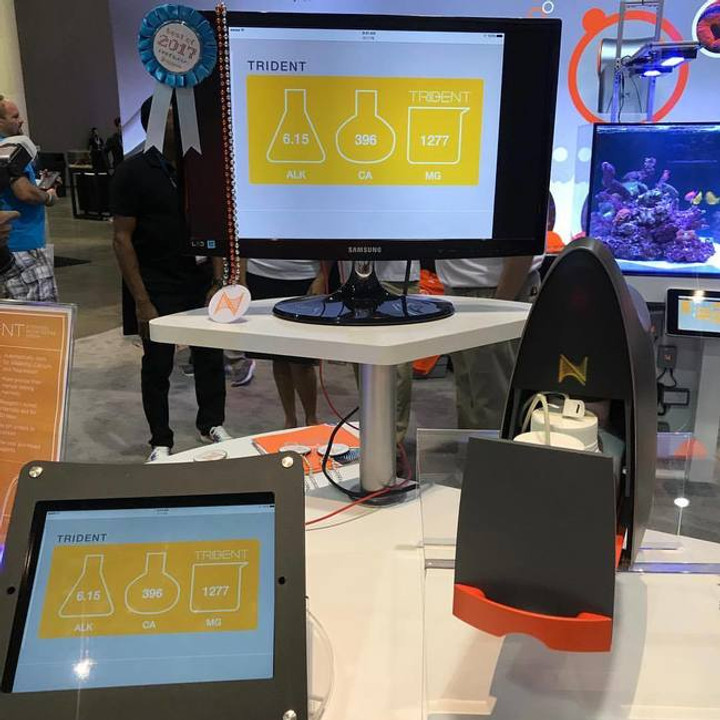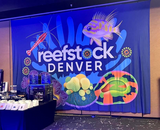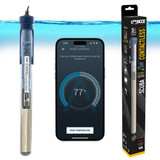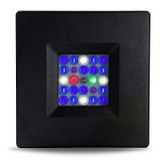Neptune System Trident FAQ
Trident FAQ
The Trident is based on a alkalinity testing technology we acquired from
Jim Welsh a few months after MACNA 2016 and, with Jim's continued help,
we have made incredible leaps forward from just testing Alkalinity. The
Trident automates the testing of Alkalinity, Calcium, and Magnesium.
There have been many questions and rumors since we announced last week.
In this post, I will provide you with as much information as I can as it
stands now, regarding the Trident. Please understand that a number of
things either have not yet been decided, or we have yet to finish final
testing and do not want to put something out there that we may later
need to retract.
So here is the FAQ for the Trident as it stands today:
What does the Trident measure?
The Trident was designed for reefkeepers. It tests for the three things
that are the building blocks of coral skeletons in our reef tanks (and
what our customers have been asking about for years): Alkalinity (dKH),
Calcium, and Magnesium.
What are the connections?
The Trident connects to your Apex via a 1LINK connection, or via the
AquaBus with an external power supply. It also has two tubes out the
back, one to draw sample water from your tank, and the other to send
waste to a container or a drain.
Does it have a pH probe inside?
No, the Trident has no pH probe inside that might require frequent calibration.
How does it work?
The Trident basically automates the proven method that you (and
scientists) already know and use - Titration. Since the Trident uses
micro-drops delivered via a stepper-motor driven peristaltic pump along
with an electric eye, we have taken the human element out of the
equation.
So, how accurate is it?
The Trident produces amazingly consistent results. Alkalinity is +/- 0.05 dKH and both Calcium and Magnesium are +/- 10ppm
How long will the reagent last?
The default testing schedule is 4x Alkalinity tests per day and 2x
Magnesium and Calcium tests per day. At that rate the reagents will cost
about $20/month. That's a per test cost less than any other test kit on
the market today.
Can I test more or less frequently than that?
Yes, within limits. There are operational limits on both ends. Obviously
the test takes time so only so many can be fit in a day. Also, once
unsealed, the reagents will have a more shortened lifespan. That said we
are fairly confident that you should be able to run less tests and get
two months out of one set of reagents.
How much will the reagents cost?
Reagents will be ready-to-use (nothing to mix up), sold in two-month kits and cost ~$40.
How much tank sample water is taken?
Compared to products that only do alkalinity testing, the Trident uses
very little tank water for its samples and produces very little waste.
While most testing systems shown to date create 50-90ml of waste per
test, the Trident produces under 15ml of waste for all three tests (Alk,
Ca, Mg).
Is the Trident a standalone system?
No, the Trident requires the latest Apex to operate. However, the
Trident does not require any external devices like dosing pumps and does
not require any outside vessels for reagent or rinse water.
Why won't the Trident work with the previous Apex models like the Apex Classic?
With the advancement of technology, many times the resources available
in prior systems is just not adequate for new devices. We see that with
iPhones, gaming consoles, TVs, and many other devices in our lives.
There are two key reasons why the Trident will not work with the Apex
Classic. 1. Every Apex system must contain the working software for all
the devices in the ecosystem. More complicated devices like the Energy
Bar 832 and the Trident take up a great deal of code space. More than
that is available on the previous Apex models. 2. The Energy Bar 832 and
the Trident require more computational horsepower to operate than what
is available in the now 10-year-old-designed Apex Classic hardware.
But you said that you would not leave Apex Classic owners behind?
And we haven't. Since the new Apex was released last year, we have
developed a new module (FMM) and many more features in the Apex Fusion
cloud service that everyone can take advantage of. At the time of launch
last year I said that the only device at that time that would not work
was the Energy Bar 832 and that nothing else was in the works at that
time - but something could come along. And it did - subsequent to MACNA
last year. And remember, we even made the COR compatible with the Apex
Classic.
Will the new Apex Base Unit be available separately?
At this point our demand for complete Apex Systems is so great that we
cannot shift the supply to selling the Apex Base Units on their own.
This may happen down the road, but customers should realize that the
value in getting a complete new Apex System will always be greater than
buying the components individually. The new Apex System also comes with
the advanced Energy Bar 832 and a set of our new double-junction probes
that many customers might need to replace anyways. And remember, the new
Apex is backward compatible with all of your existing Neptune Systems
products.
How big is the Trident?
When we designed the Trident we wanted to make it as self-contained as
possible. This meant that we wanted all the hardware and all of the
reagents to be contained under a single, attractive enclosure. No tubes
going this direction or that. No bottles to have to hide. We were able
accomplish this in a space of just 4"W x 10"H x 12"D. The Trident should
fit nicely under the stands of most aquariums. We intend on having an
optional wall bracket available as well.
How much will the Trident cost?
No firm pricing will be released at this time, but we are committed to bring this to market between $500 and $600.
When will it be available?
We hope to have units in the hands of our Neptune Systems Insiders by
the end of Q1/2018 and have it available to the general public in
Q2/2018.
Explore Popular Articles
-
ReefStock Denver is This Weekend!
Feb 27, 2024The time is finally here. Reef Builders ReefStock Show is coming to the Crowne Plaza Hotel in Denve
-
Sicce's New Scuba Heater!
Oct 23, 20235 Year Warranty, High Quality Italian Made, A Heater for the FUTURE! Innovative heater range eq
-
Current USA R24 LOOP LED
Oct 23, 2023Compact lighting with SPS coral growing power. For those who love the Orbit® Marine, the Orbit® R




